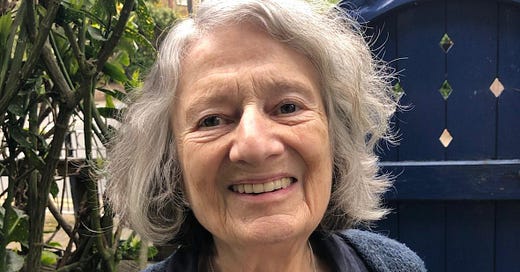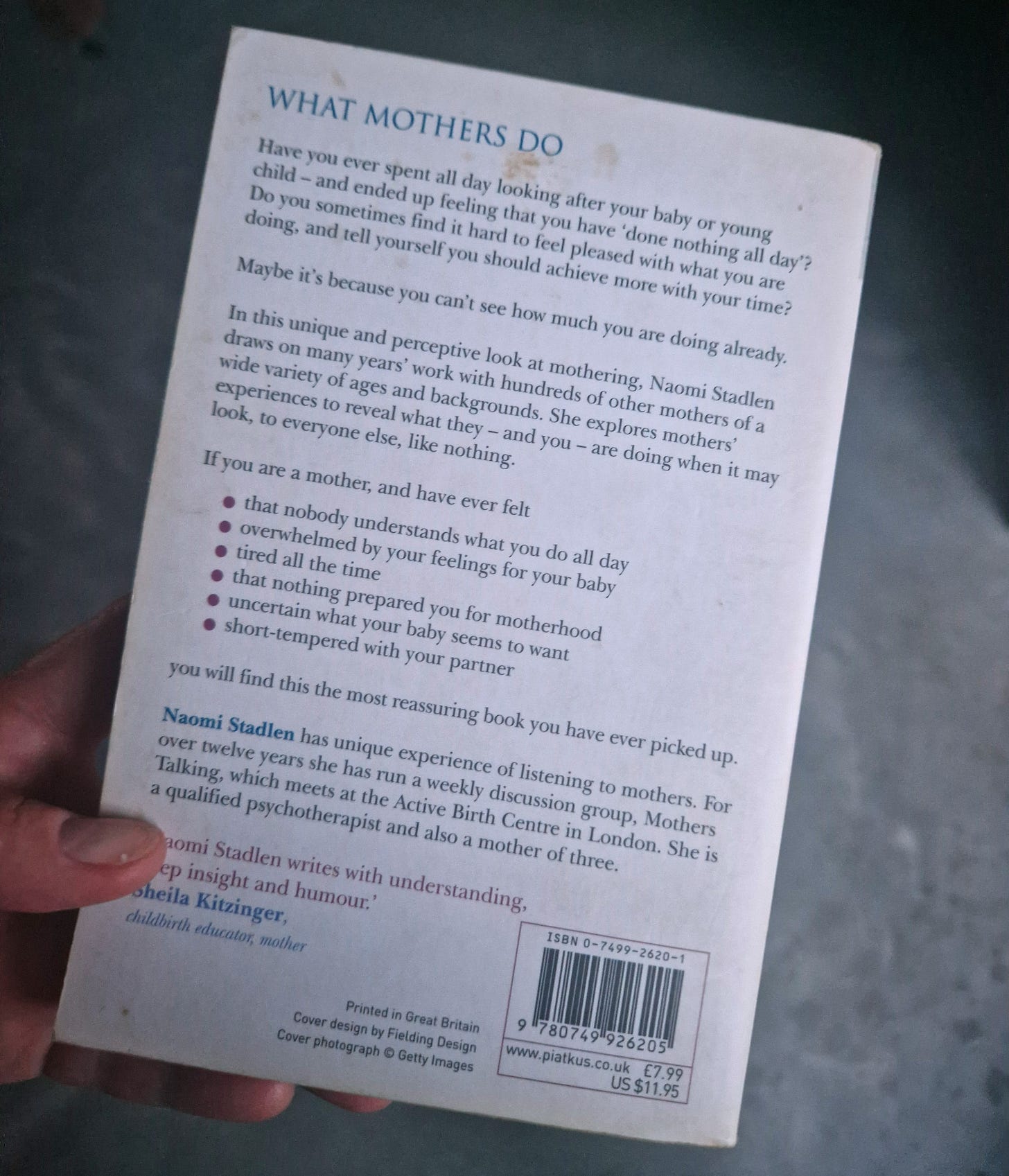Books can change your life, and this one changed mine.
So it was with great sadness that I heard that the author, Naomi Stadlen, died last Friday, and I wanted to pay tribute to her by telling you how her book impacted on me, and doubtless countless other new mothers.
I had absolutely no idea what I was doing when I had my first baby. I am an only child, and I don’t think I had ever even held a baby until I first held my daughter, in the cold and dark January of 2008. I was excited to become a mother, but I didn’t really like the whole commercialism of it either, so I avoided buying loads of outfits and equipment, and just focused on how I would give birth and where, believing that this was important. It was. But it did mean that all my homework and preparation only took me up to the moment the baby was placed on my chest. I didn’t even think about what happened next.
I think this was mainly avoidance, because the whole thing just felt too vast to contemplate. A new phase of my life was about to begin, but this also meant that another phase of my life was over. I was a party person, and I liked my freedom. I could feel both parties and freedom slipping rapidly out of my grasp during the pregnancy itself, in particular when my partner and a bunch of his / our friends went off to get into Glastonbury festival via slightly illicit means. The project didn’t feel quite safe for a pregnant woman, so I stayed behind, feeling left out and completely cheesed off. No matter, I thought, everything will go back to normal when the baby arrives. Ha. What a massive load of denial that was.
Then the baby did arrive, not with the home birth I’d hoped for but with a hospital induction for ‘being overdue’ that ended in episiotomy and forceps. Battered and traumatised, I took my baby home the same day - anything to get away from a place where I did not feel safe or cared for.
Once home, the really hard part began. Breastfeeding went OK but I didn’t know that you could sort of ‘unplug’ the baby once she had fallen asleep, and I think this probably contributed to my daughter becoming completely dependent on me as a kind of human dummy, waking every 45 minutes and crying for me throughout the night, for months. I found it all really tough: at a superficial level, because I was on my knees with sleep deprivation; and at a deeper level, because I felt really lost in motherhood, unskilled, unprepared, lonely, and deeply in love with a tiny human I was desperate to be the perfect mother to. I loved her, but I didn’t know if I was giving her what she wanted or needed. I didn’t know if I was ‘enough’.
The hardest part of it all was that I thought I was the only person in the world who felt like this. I wasn’t depressed, it was more like I felt I had been flicked by a giant hand into space. Everyone else seemed to be coping brilliantly while I was up there, floating around untethered amidst the galaxies. I didn’t even seem able to get dressed some days. Why not? Why was it so hard to leave the house? What was I doing wrong? Come to think of it, what was I actually doing?! Imagine how much it meant to me when I saw the title of Naomi’s book. Better still, when I flipped it over and saw the bullet pointed list on the back.
If you are a mother, and have ever felt
that nobody understands what you do all day
overwhlemed by your feelings for your baby
tired all the time
that nothing prepared you for motherhood
uncertain about what your baby seems to want
short-tempered with your partner
you will find this the most reassuring book you have ever picked up.
That’s a bold claim, but What Mothers Do remains, nearly two decades and a lot of books later, the most reassuring book I’ve ever read. I read it mostly at night, whilst breastfeeding my constantly waking baby, and it was like a great weight lifted off my shoulders. “Mothers live in a universe that has not been accurately described”, wrote Stadlen, but she changed that. She saw me drifting around in space and she described for me exactly how it felt. Perhaps even more reassuringly, she brought in the words of other new mothers, which sang to me from the pages and broke my spell of isolation and anxiety. “Mothers complain about their physical isolation”, she writes, “but surely a more fundamental isolation is about not being understood”.
As well as describing motherhood, Stadlen’s books is a love letter to mothers, telling them not just what they ‘do’, but why it is such important work, the most important work. At a time when I felt so low in confidence and uncertain, Stadlen articulated for me both why I felt this way and why I should not: “Mothers, who are doing so much, often describe themselves as sitting around, doing nothing. They feel lonely, invisible and unimportant. Yet their work belongs to much more than one organisation. Each mother is preparing her child to belong to the society that we all share. It doesn’t seem too much to say that the whole of civilisation depends on the work of mothers.”
Even at the time, Stadlen acknowledged in the book that mothering, or at least, describing mothering as something unique and important, could be thought unfashionable. She was honest about how she felt mothering to be an important role in spite of social and cultural pressure on women to ‘get back to normal’, 'get back to work’, ‘get their bodies back’, ‘get the baby to be less dependent’ and so on. But I think Stadlen understood the transition to motherhood, and motherhood itself, as something eternal that happens deep in a woman’s psyche, rather than affected by passing fashions or subject to change. She doesn’t preach a particular style or approach of mothering, either, because mothering isn’t about style or approach, or even, in the true sense of the word, what you do. Mothering just IS. Once you have given birth, you simply are a mother, and you are doing the work of mothering. And Stadlen supports, admires and adores you for it.
When I read her book, my own first work of non fiction, The Positive Birth Book, was nearly a decade away from publication, but she surely influenced me greatly as a writer, in the main by showing me that a work of non-fiction isn’t just a collection of words on a page; it can be transformative or even life saving. I send her huge thanks and appreciation for this, but even more so for reaching out a hand and coaxing me gently back down to earth when I was lost in space, and for reassuring me that the work I was doing wasn’t nothing after all, it was everything.
May her book live on and continue to champion women as they navigate one of life’s hardest transitions.










I have treasured all of Naomi's books and I agree that "What mothers do" should be required reading, not just for women who are pregnant or who have had babies, but for everyone. How many of us mums have been subjected to the "jokes" and barbs about how "lucky" we are to be having "time off" when we are caring for babies and children?
We are forming the adults of the future by forging the foundational relationship that is the mother/baby dyad. This is the most important relationship we will ever have as it is the one that we will repeat and remodel in every subsequent human interaction we have.
"What it means to be human is summed up by Winnicott as, “It is a joy to be hidden but a disaster not to be found”. We all value privacy and need time to think our own thoughts. But to not to have a mother who knows and understands us, who does not “find” our real self is a disaster indeed. For in our mother finding us, we are able to find ourselves." https://lucyleader.substack.com/p/donald-woods-winnicott
How lovely, Milli! I will recommend it to a pregnant young woman I know!